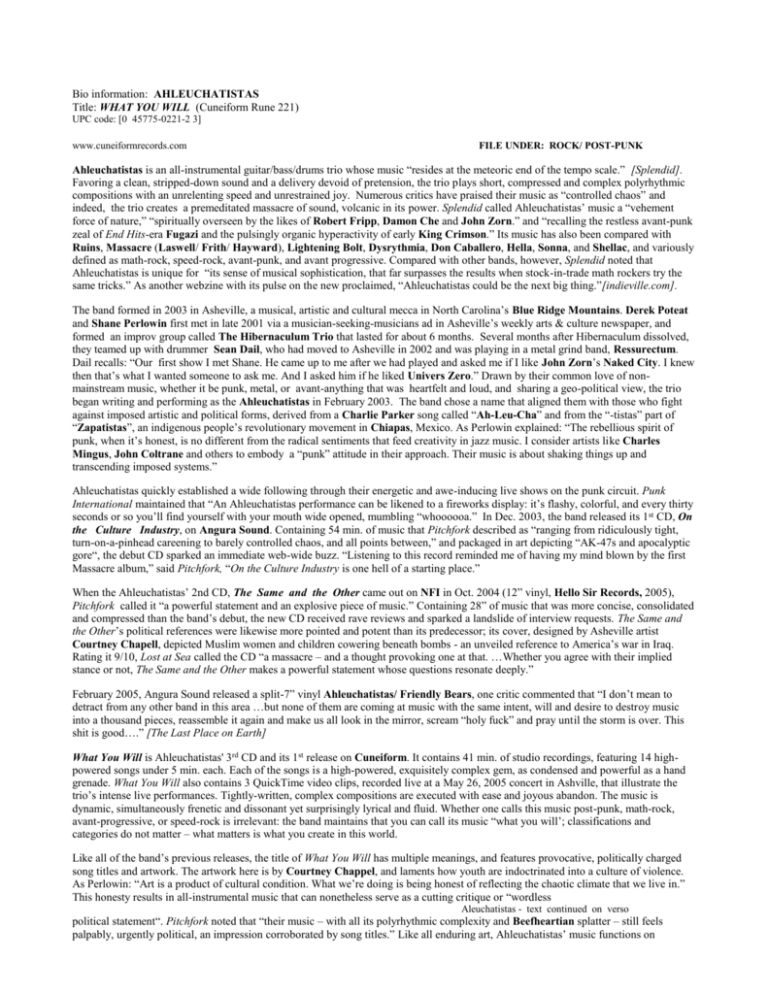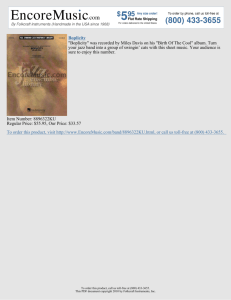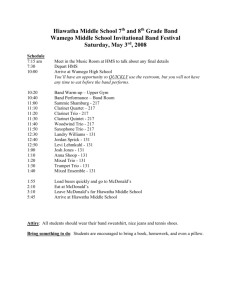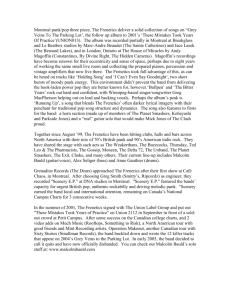Ahleuchatistas "What You Will"
advertisement

Bio information: AHLEUCHATISTAS Title: WHAT YOU WILL (Cuneiform Rune 221) UPC code: [0 45775-0221-2 3] www.cuneiformrecords.com FILE UNDER: ROCK/ POST-PUNK Ahleuchatistas is an all-instrumental guitar/bass/drums trio whose music “resides at the meteoric end of the tempo scale.” [Splendid]. Favoring a clean, stripped-down sound and a delivery devoid of pretension, the trio plays short, compressed and complex polyrhythmic compositions with an unrelenting speed and unrestrained joy. Numerous critics have praised their music as “controlled chaos” and indeed, the trio creates a premeditated massacre of sound, volcanic in its power. Splendid called Ahleuchatistas’ music a “vehement force of nature,” “spiritually overseen by the likes of Robert Fripp, Damon Che and John Zorn.” and “recalling the restless avant-punk zeal of End Hits-era Fugazi and the pulsingly organic hyperactivity of early King Crimson.” Its music has also been compared with Ruins, Massacre (Laswell/ Frith/ Hayward), Lightening Bolt, Dysrythmia, Don Caballero, Hella, Sonna, and Shellac, and variously defined as math-rock, speed-rock, avant-punk, and avant progressive. Compared with other bands, however, Splendid noted that Ahleuchatistas is unique for “its sense of musical sophistication, that far surpasses the results when stock-in-trade math rockers try the same tricks.” As another webzine with its pulse on the new proclaimed, “Ahleuchatistas could be the next big thing.”[indieville.com]. The band formed in 2003 in Asheville, a musical, artistic and cultural mecca in North Carolina’s Blue Ridge Mountains. Derek Poteat and Shane Perlowin first met in late 2001 via a musician-seeking-musicians ad in Asheville’s weekly arts & culture newspaper, and formed an improv group called The Hibernaculum Trio that lasted for about 6 months. Several months after Hibernaculum dissolved, they teamed up with drummer Sean Dail, who had moved to Asheville in 2002 and was playing in a metal grind band, Ressurectum. Dail recalls: “Our first show I met Shane. He came up to me after we had played and asked me if I like John Zorn’s Naked City. I knew then that’s what I wanted someone to ask me. And I asked him if he liked Univers Zero.” Drawn by their common love of nonmainstream music, whether it be punk, metal, or avant-anything that was heartfelt and loud, and sharing a geo-political view, the trio began writing and performing as the Ahleuchatistas in February 2003. The band chose a name that aligned them with those who fight against imposed artistic and political forms, derived from a Charlie Parker song called “Ah-Leu-Cha” and from the “-tistas” part of “Zapatistas”, an indigenous people’s revolutionary movement in Chiapas, Mexico. As Perlowin explained: “The rebellious spirit of punk, when it’s honest, is no different from the radical sentiments that feed creativity in jazz music. I consider artists like Charles Mingus, John Coltrane and others to embody a “punk” attitude in their approach. Their music is about shaking things up and transcending imposed systems.” Ahleuchatistas quickly established a wide following through their energetic and awe-inducing live shows on the punk circuit. Punk International maintained that “An Ahleuchatistas performance can be likened to a fireworks display: it’s flashy, colorful, and every thirty seconds or so you’ll find yourself with your mouth wide opened, mumbling “whoooooa.” In Dec. 2003, the band released its 1st CD, On the Culture Industry, on Angura Sound. Containing 54 min. of music that Pitchfork described as “ranging from ridiculously tight, turn-on-a-pinhead careening to barely controlled chaos, and all points between,” and packaged in art depicting “AK-47s and apocalyptic gore“, the debut CD sparked an immediate web-wide buzz. “Listening to this record reminded me of having my mind blown by the first Massacre album,” said Pitchfork, “On the Culture Industry is one hell of a starting place.” When the Ahleuchatistas’ 2nd CD, The Same and the Other came out on NFI in Oct. 2004 (12” vinyl, Hello Sir Records, 2005), Pitchfork called it “a powerful statement and an explosive piece of music.” Containing 28” of music that was more concise, consolidated and compressed than the band’s debut, the new CD received rave reviews and sparked a landslide of interview requests. The Same and the Other’s political references were likewise more pointed and potent than its predecessor; its cover, designed by Asheville artist Courtney Chapell, depicted Muslim women and children cowering beneath bombs - an unveiled reference to America’s war in Iraq. Rating it 9/10, Lost at Sea called the CD “a massacre – and a thought provoking one at that. …Whether you agree with their implied stance or not, The Same and the Other makes a powerful statement whose questions resonate deeply.” February 2005, Angura Sound released a split-7” vinyl Ahleuchatistas/ Friendly Bears, one critic commented that “I don’t mean to detract from any other band in this area …but none of them are coming at music with the same intent, will and desire to destroy music into a thousand pieces, reassemble it again and make us all look in the mirror, scream “holy fuck” and pray until the storm is over. This shit is good….” [The Last Place on Earth] What You Will is Ahleuchatistas' 3rd CD and its 1st release on Cuneiform. It contains 41 min. of studio recordings, featuring 14 highpowered songs under 5 min. each. Each of the songs is a high-powered, exquisitely complex gem, as condensed and powerful as a hand grenade. What You Will also contains 3 QuickTime video clips, recorded live at a May 26, 2005 concert in Ashville, that illustrate the trio’s intense live performances. Tightly-written, complex compositions are executed with ease and joyous abandon. The music is dynamic, simultaneously frenetic and dissonant yet surprisingly lyrical and fluid. Whether one calls this music post-punk, math-rock, avant-progressive, or speed-rock is irrelevant: the band maintains that you can call its music “what you will’; classifications and categories do not matter – what matters is what you create in this world. Like all of the band’s previous releases, the title of What You Will has multiple meanings, and features provocative, politically charged song titles and artwork. The artwork here is by Courtney Chappel, and laments how youth are indoctrinated into a culture of violence. As Perlowin: “Art is a product of cultural condition. What we’re doing is being honest of reflecting the chaotic climate that we live in.” This honesty results in all-instrumental music that can nonetheless serve as a cutting critique or “wordless Aleuchatistas - text continued on verso political statement“. Pitchfork noted that “their music – with all its polyrhythmic complexity and Beefheartian splatter – still feels palpably, urgently political, an impression corroborated by song titles.” Like all enduring art, Ahleuchatistas’ music functions on multiple levels. As Pitchfork explains: “Ultimately, when listening… you can take the Wassily Kandinsky approach – abstract art is concrete, he famously insisted – or you can …read it is an allegory for contemporary strife and suffering…”. Whether appreciated solely as instrumental music, or for the additional content its packaging implies, the CD is What You Will. SEAN DAIL Drummer Sean Dail grew up listening to his dad’s progressive rock, and reverently cites Hawkwind as an enduring influence. Hearing Green Day’s Kerplunk got him into punk. Dail began his music career at age 12, as the front man on vocals and guitar for Popular Rejection, a punk-rock band that covered Green Day, nofx, and Decendents and played originals. In his next band, a hard- edged group called Regurgistate, he taught himself to play drums as though he still played lead: “I am a front man, I thought. So with that in mind I taught myself to play fast enough to keep up with the thrashing guitar licks. Soon after I started playing with a double kick pedal…”. Listening to “anarcho-crust-grind-punk stuff like Dystopia, Dissasociate, Dropdead and Capitalist Casualties” as a young teen, he discovered King Crimson, Gong and other psychedelic rock, and such avant progressive bands as Univers Zero, Blast and Happy Family when he was 17. Dail played in various psych-rock projects in Raleigh, NC before moving to Asheville in 2002, where he played in Ressurectum before joining Ahleuchatistas. SHANE PERLOWIN Guitarist Shane Perlowin discovered music by Frank Zappa, King Crimson and John McLaughlin early on. When he was 16, he purchased John Coltrane’s Giant Steps which, he said, “changed everything” and led him into jazz. Perlowin played in numerous jazz and experimental improv groups. When he lived in Florida, he played in Human Zoo, a Brand X-Pastorius-Fripp-esque fusion band, and Agni, a 12-piece Indian fusion ensemble led by Nalini Vinayik. In Asheville, he belonged to a hardcore punk band Shovel Fight (2002-2003). Besides Ahleuchatistas, Perlowin belongs to a jazz group, The Toebox Trio. Perlowin cites Coltrane, Miles Davis, Charles Mingus; Philip Glass, Ruins, Steve Reich, John Cage, Zappa and John Zorn as some of his musical influences. A student at the University of North Carolina-Asheville, Perlowin is a minor in Music, studying under jazz guitarist Tim Haden; his major is Philosophy. DEREK POTEAT Bassist Derek Poteat’s background was mainly in rock, metal, jazz, and progressive rock. He grew up listening to his parents’ Country music, and particularly Johnny Cash. While he maintains that Country hasn’t influenced his playing, “it definitely has scarred me as a human being”. He began playing music as an adolescent, listening to Led Zeppelin, the Doors, and Pink Floyd; his 1st concert was Judas Priest. Hearing Metallica’s Master of Puppets, featuring bassist Cliff Burton, inspired Poteat to play bass; unlike most bassists, he plays without a pick.. While he listens to a broad spectrum of music that includes Philip Glass, Melvins, Ruins, Coltrane, Johnny Cash, and everything in between, and he admires the tone of bassists Chris Squire (Yes) and John Wetton (Crimson), he cites life, people and the world as the biggest influences on his music. ********************* We asked Ahleuchatistas to tell us a little about the titles in What You Will. Here’s what they said: What You Will has a few different meanings and that is why it was so appealing to us as the title for this work. About the song titles: 1. “Remember Rumsfeld at Abu Ghraib”--this is an explicit protest title, but also a veiled tribute to Charles Mingus, who had a song on his Changes II album called “Remember Rockefeller at Attica”. 2. “Shell in Ogoniland”--Shell Oil has devastated millions of lives in the Niger Delta. A particularly brutal policy has been in operation where the Ogoni minority reside. 3. “Maybe Orange”--Perhaps. 4. “Unfolding”--A descriptive title with deep philosophical implications. 5. “Sherman's March”—a reflection on Atlanta’s burning. 6. “Sometimes There's a Buggy”--inspired by David Lynch's Mullholland Drive. 7. “If, whenever”--A nihilistic title to a very short song. 8. “Ho Chi Minh is Gonna Win!”--Not a celebration of the Vietnamese icon, this title is more a reflection on the current insurgency in Iraq. I think I saw some footage of a Vietnam war protest and all the people were chanting "Ho chi Minh is Gonna Win!" Did somebody say 'quagmire'? 9. “Before the Law”--This is a very pensive song. It is a minimal improvisation that came out very beautifully. It is a moment of repose on the record. It is also the title of a short story by Franz Kafka about a man who waits his whole life at the gates of the law to gain entry, only to die an old man who waited his whole life for nothing. 10. “I Used to Be Just Like You, But Now I Am Just Like Me”--This is a fun title. 11. “Now, Now is Then”--Its almost a zen koan. Time is so difficult to pin down. But, maybe pinning it down is not the goal. 12. “Last Spark From God”--We felt that we were divinely inspired when this one came to us. Odd. The descending cycle at the end has a kind of wind-down effect, with sputtering feedback afterwards. 13. “What Are You Gonna Do?”--Again, with the willing. Oy vey!! But, seriously, what are you gonna do? 14. “You Know My Family”--this song has a lot of personal meaning and baggage attached to it for the boys in Ahleuchatistas. It is a recognition of how close we have become because of this magical connection we have through music. Isn't life something?





